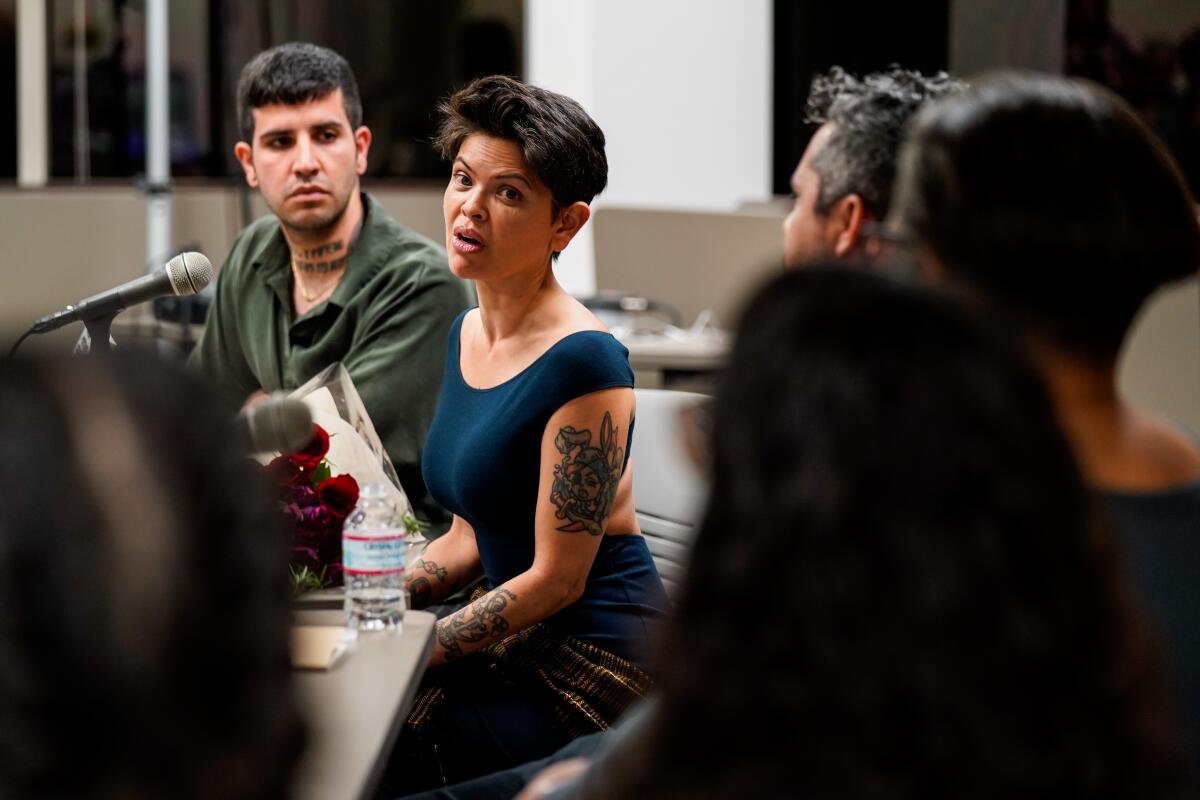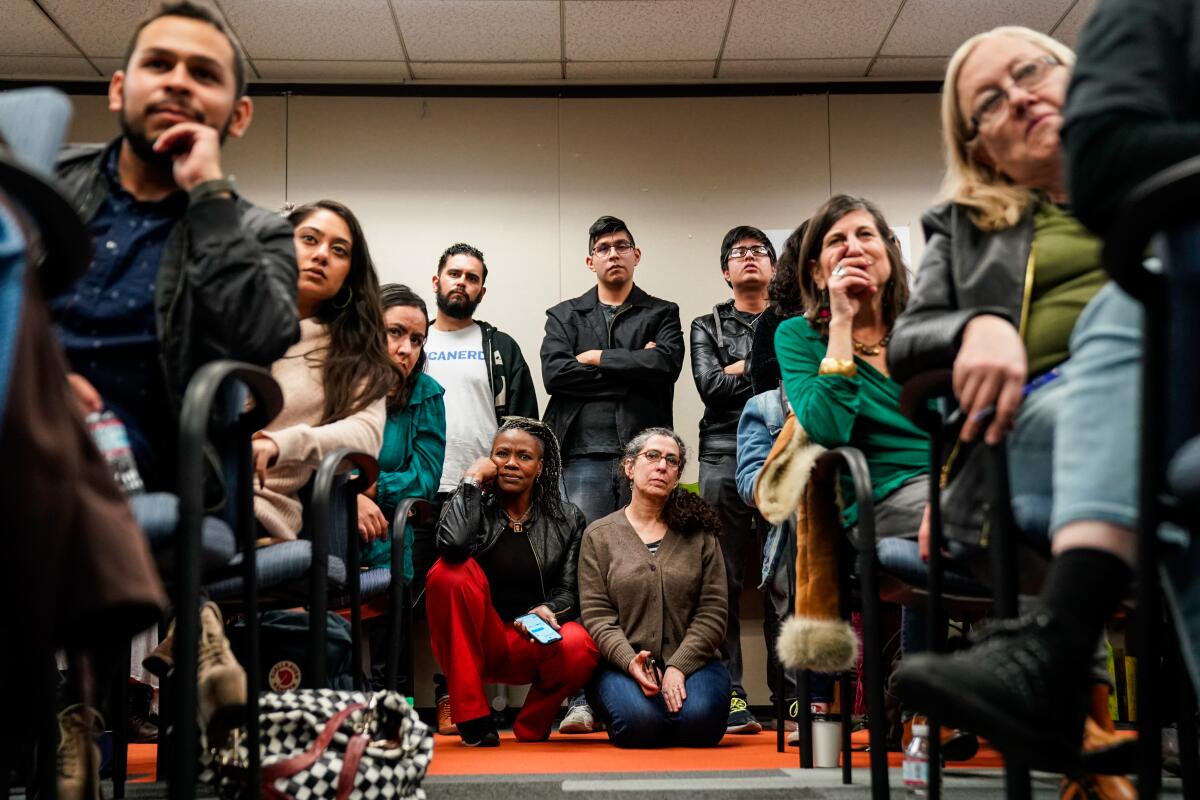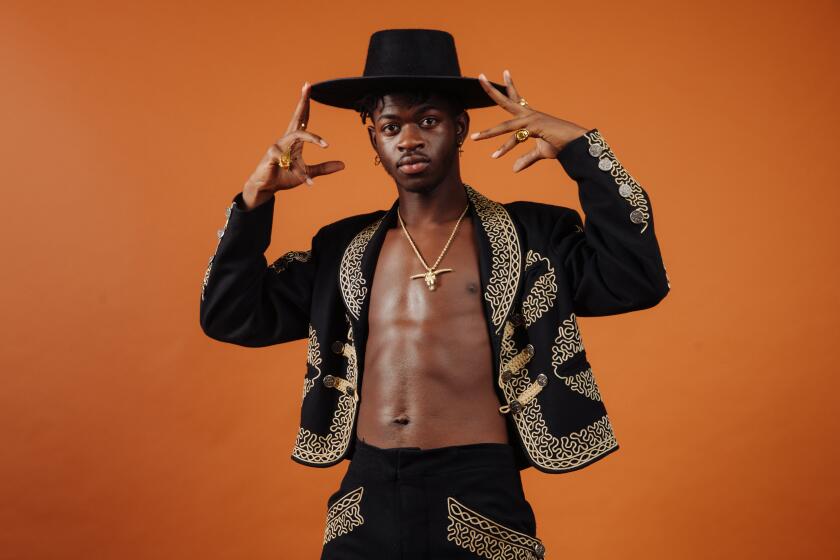Roxane Gay, Myriam Gurba and others discuss the publishing ‘crisis’ after ‘American Dirt’

- Share via
Long before Jeanine Cummins’ highly contentious “American Dirt” was published by Flatiron Books, the novel was raising red flags internally, according to Myriam Gurba.
“I’ve spoken to people who work in Flatiron who have told me that the book was identified as problematic from the get-go,” Gurba alleged, speaking before a packed room on Thursday at a panel organized by her new group, #DignidadLiteraria. “And people’s critiques were either dismissed or they felt coerced into being silent. ... They knew that this could happen and they went through with it anyway.”
For the record:
12:15 p.m. Feb. 8, 2020An earlier version of this article misstated the age of the title character in the book “My Dark Vanessa.” She was 32 when she confronted a relationship she had had with a teacher 17 years before, when she was 15.
Flatiron Books, which is a division of Macmillan Publishing, did not immediately respond to a Times request for comment.
‘American Dirt’ publisher Flatiron Books announced on Wednesday that it was canceling its book tour with Jeanine Cummins.
Gurba, an author and high school teacher in Long Beach, wrote a negative review of the novel that was first published on the online site Tropics of Meta. Her critique became the catalyst for one of the biggest controversies in U.S. publishing in recent years. The panel, held at Antioch University in Culver City, hosted a crowd of around 100 people. In a nod to the #OwnVoices movement, dozens of books by people of color were on display near the back. A diverse audience of activists, book sellers, professors, writers and other community members filled seats or stood along the perimeter, occasionally nodding, clapping and murmuring in agreement over remarks made by the panelists on the dais.
They were there to hear Gurba, Roxane Gay, Romeo Guzman, Wendy C. Ortiz and Christopher Soto talk about the publishing industry.
The event was part of #DignidadLiteraria’s national week of action, a series of town halls to discuss Latinx visibility in the U.S. It was the first panel to be held since authors and #DignidadLiteraria founders Gurba, David Bowles and Roberto Lovato met with Macmillan publishers and others on Monday to discuss steps the imprint can take to amplify Latinx voices in the industry.
The hashtag and movement emerged in the wake of the “American Dirt” controversy and comprises writers advocating for Latinx people in the publishing world.
During Monday’s meeting in New York, Macmillan committed to increasing its number of Latinx staff, authors and titles and to changing the “overall ecosystem.” It also vowed to develop an action plan to address those goals within 90 days and to regroup with the cohort in 30 days to evaluate progress.
Responding to Gurba’s claim that Flatiron ignored red flags, Gay said she believes the publisher will continue to dismiss them because “American Dirt” is selling so well, having debuted at No. 1 on the New York Times Bestsellers list. “This woman is going to be set for life, this book is going to earn royalties in perpetuity, and so it just reinforces what publishing already knows, which is as long as white people are translating the experiences of people of color, it will sell very well,” said Gay, the bestselling author of “Hunger” and “Bad Feminist.”

Gay took time out of a busy speaking and writing schedule to appear in her capacity as the editor of Ortiz’s article on the topic, “Adventures in Publishing Outside the Gates,” in her online journal, Gay Mag.
The wide-ranging discussion coalesced around a couple of flashpoints. One of them was panelists’ differences with white feminists.
Ortiz recounted the negative reactions she’s received after publishing her essay, which called out the similarities between her 2014 memoir, “Excavation,” and Kate Elizabeth Russell’s forthcoming, highly anticipated and heavily promoted novel “My Dark Vanessa.”
“Excavation” is about the five-year sexual relationship between the teenage Ortiz and her eighth-grade English teacher. “My Dark Vanessa,” for which Russell received a seven-figure advance, tells a similar story: A woman confronts the sexual relationship she had with her English teacher when she was 15 after another student accuses him of sexual abuse.
Ortiz said some critical responses have taken the form of “racism ... cloaked in white feminism.”
Gay said that it has been white women who’ve rallied to defend Russell against Ortiz, who has called the book “a fictional take on a reality I lived.” (On the panel, Ortiz denied that she had ever alleged plagiarism.)
Gay said that accusations of professional envy and demands for apologies of the kind that dogged Ortiz are common. “We see this a lot in online discourse where people see something that triggers or upsets them, and they worry that it could happen to them someday. So they get behind whoever they perceive is the biggest victim, and it’s always going to be the white woman.”
Another topic addressed by the panel was the question of whether it was better to use small presses when the corporate gatekeepers failed to embrace them.
Gurba said #DignidadLiteraria had suggested during the Macmillan meeting that the publisher start a Latinx imprint. “We gave them basically a business model for it ... [but] they didn’t even want to touch the paper. ... Mexican Americans are scary people!” she said, laughing.
Before the conversation was opened up to the audience, moderator Xochitl-Julisa Bermejo asked the panelists how people of color can hold big publishers accountable while also supporting small presses.
Gay advised people to keep raising their voices. “The only reason Macmillan responded is because the backlash was so significant and so concentrated and it has not gone away,” she said. “That just shows that when we speak up as people of color, it actually does something when we do it in numbers.”
She emphasized that supporting small publishing isn’t always the sole answer because it “lets big publishing off the hook,” and it doesn’t change the fact that the so-called Big Five control the vast majority of the books we get to read. Gay encouraged consumers to educate themselves on what’s happening in small presses and “make one of every three book purchases a small-press book, if not more.”
In any event, she was skeptical of the common complaint that the publishing industry is declining and in need of support. “Big publishing is going to be OK.”
More to Read
The biggest entertainment stories
Get our big stories about Hollywood, film, television, music, arts, culture and more right in your inbox as soon as they publish.
You may occasionally receive promotional content from the Los Angeles Times.











